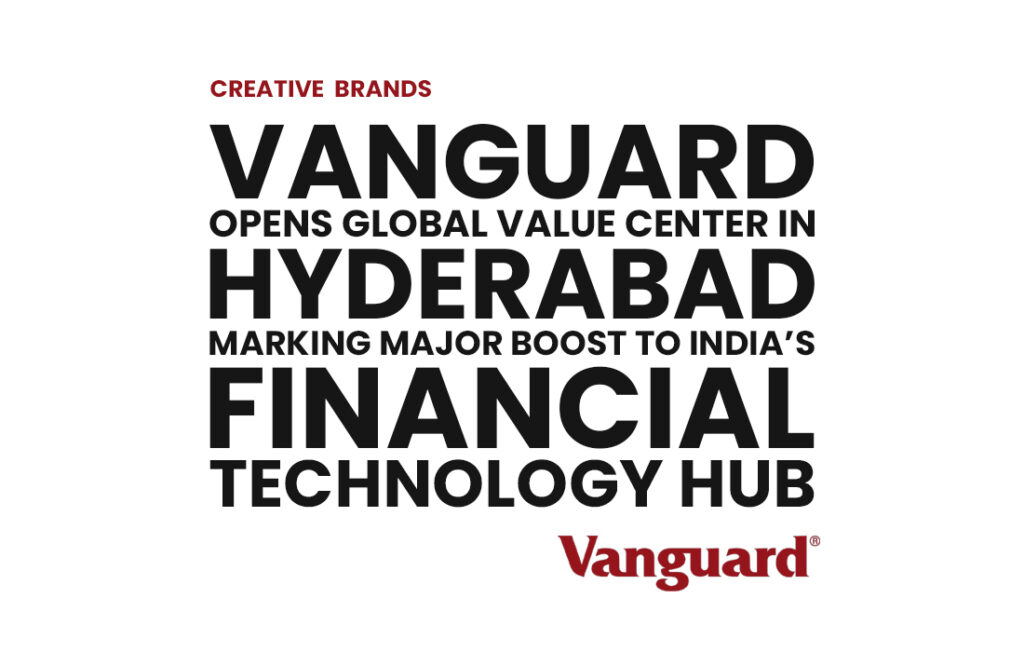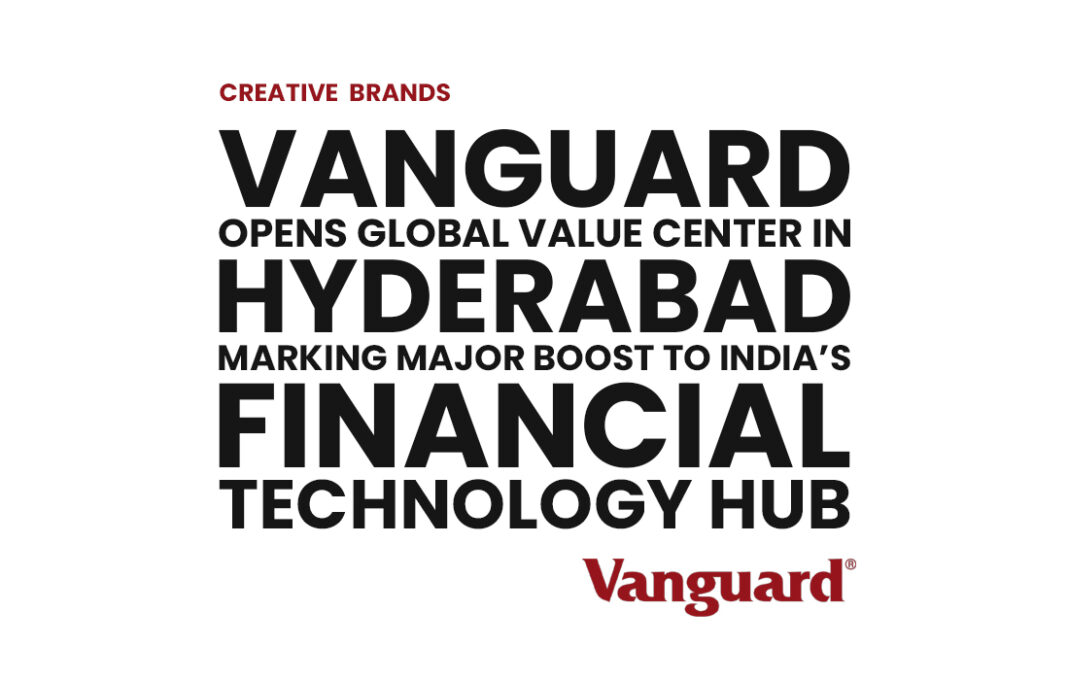Global asset manager Vanguard has inaugurated its 500,000 sq ft Global Value Center in Hyderabad, reinforcing the city’s status as a financial technology powerhouse. Backed by Telangana ministers, the center will scale to over 2,000 employees in four years, strengthening Vanguard’s global operations and advancing India’s role in high-value financial services.

Vanguard’s decision to establish its Global Value Center (GVC) in Hyderabad marks one of the most significant developments in India’s fast-expanding global capability center landscape, reinforcing the city’s growing reputation as a preferred destination for financial technology, operations, and innovation. For a company that manages more than US $12.5 trillion in assets globally, the move represents far more than a facility expansion; it signals a strategic long-term commitment to tapping India’s talent ecosystem and integrating Hyderabad into the core of Vanguard’s global operations.
The inauguration of the 500,000 sq ft center was presided over by Telangana’s Deputy Chief Minister Bhatti Vikramarka Mallu and IT and Industries Minister Sridhar Babu Duddilla—an indication of the state’s strong emphasis on attracting next-generation investment from global financial institutions. Their presence underscores how Vanguard’s arrival is seen as both an economic milestone and a symbolic win for Telangana’s ambitions to position itself as India’s most future-ready hub for global enterprises.
Vanguard’s Global Value Center is designed with a clear scale-up plan: it is expected to house more than 2,000 employees within the next four years, covering a wide spectrum of roles across technology, analytics, client experience, cybersecurity, operations and enterprise services. For Hyderabad, which has already attracted dozens of major banking, financial services and insurance (BFSI) GCCs, this development adds a heavyweight institution to the roster and deepens the city’s credibility in the global financial ecosystem.
The new facility is a purpose-built space reflecting Vanguard’s reputation for discipline, long-term planning and people-first design. Though the firm is known globally for transforming the investment landscape through its low-cost index funds and long-term investor focus, its India presence is being described as equally transformative. The GVC is not merely a delivery center or a back-office unit—it is envisioned as a strategic hub integrating Vanguard’s global mission with India’s growing strength in technology-driven financial innovation.
For Hyderabad, Vanguard’s entry comes at a time when the city has already seen an acceleration of large-scale investments from leading global companies. Over the past decade, its blend of cost competitiveness, high-quality talent pools, and a proactive government has enabled it to attract not only tech majors, but also hedge funds, insurers, and asset management firms building data, risk, engineering and operational capabilities in India. Vanguard’s arrival validates that trajectory further, especially because the firm is known for its cautious, deliberate decision-making and long-term orientation.
Speaking at the inauguration, Deputy Chief Minister Bhatti Vikramarka Mallu emphasized that Telangana is committed to fostering an environment where global firms can innovate and grow without friction. He noted that Hyderabad’s combination of stability, infrastructure and skilled workforce has repeatedly proven reliable for multinational organizations. The establishment of the GVC, he said, reflects how global corporations increasingly view the city as a partner in building talent-driven global operations.
IT and Industries Minister Sridhar Babu Duddilla echoed this sentiment, adding that Vanguard’s decision highlights the trust global institutions place in Telangana’s policy ecosystem. He reiterated the state’s intent to expand its momentum in financial services and technology, ensuring that Hyderabad remains positioned among the world’s most competitive destinations for GCCs. The ministers also highlighted how such investments contribute to the broader socio-economic fabric through job creation, upskilling, and international exposure for local professionals.
Vanguard’s expansion into India comes amid a wider trend where global investment managers are deepening their reliance on diversified, multi-location operating models. As the financial sector digitizes rapidly—from robo-advisory platforms to AI-based risk management and next-gen trading infrastructure—the need for skilled talent has intensified. India has emerged as one of the few countries capable of supplying high-value technology and analytical expertise at scale, backed by a steady stream of engineering graduates, financial analysts and domain specialists.
For Vanguard, known globally as an investor-centric organization with a strong culture of ethics, controls and research orientation, the GVC offers an opportunity to build new capabilities in a talent-rich environment while maintaining operational resilience. The company’s approach to India is said to be aligned with its broader purpose-driven philosophy: building a workplace that allows teams to contribute to global financial wellbeing through innovation and long-term thinking.
Industry analysts observe that the timing of the new value center reflects both global and regional shifts. As markets grow more complex and digital channels become central to financial services, global asset managers increasingly depend on technology-driven insights and 24/7 operational continuity. Hyderabad’s fast-growing ecosystem of fintech startups, IT giants and research institutions creates fertile ground for building such high-value functions.
The move also aligns with a broader national trend: India’s GCC sector is projected to exceed 5,000 centers by 2030, with Hyderabad and Bengaluru leading the expansion. A decade ago, the sector largely focused on IT support and business process functions, but today GCCs increasingly house product design, AI research, cybersecurity command centers, cloud engineering labs and specialized financial analytics. Vanguard’s presence only accelerates this shift toward more sophisticated, capability-driven centers.
Within Vanguard’s walls, the ambition is two-fold: to support the company’s global operations more efficiently, and to serve as an engine of innovation focused on redefining the investor experience. The center is expected to contribute across digital transformation, automation, cloud infrastructure, customer insights, and enterprise risk management—areas where India’s workforce has already demonstrated deep competence. The scale plan of 2,000 employees over four years underscores the depth of investment and the long-term vision the firm brings to India.
Executives familiar with the planning process describe the GVC as an opportunity for the firm to tap into India’s strengths while maintaining a consistent global culture rooted in integrity and stewardship. Vanguard’s leadership has long emphasized the importance of balancing growth with stability, and the Hyderabad center is seen as a strategic extension of that philosophy.
For Hyderabad’s talent pool, the arrival of Vanguard opens new pathways for professionals seeking exposure to global asset management. While India has long served the IT and banking sectors, pure-play asset management firms of Vanguard’s scale are relatively few. This creates opportunities for finance and technology professionals to work on complex, high-impact projects that influence global portfolios and financial services innovation.
As the city continues to evolve as a center for financial technology, the synergy between Hyderabad’s maturing ecosystem and Vanguard’s disciplined long-term approach may prove mutually beneficial. The state government’s focus on skill development, innovation hubs, and improved connectivity adds further incentive for global firms seeking stability and scale.
Vanguard’s Global Value Center marks not just a new building, but the beginning of a strategic chapter in India’s ascent in global financial operations. For Hyderabad, it is another milestone in its transformation into a global financial and technology powerhouse. For Vanguard, it is a step toward strengthening the resilience, intelligence and efficiency of its worldwide operations. And for India’s broader GCC industry, it sends a clear message: that the country’s capability landscape is now central—not peripheral—to the future of global financial services.
Discover more from Creative Brands
Subscribe to get the latest posts sent to your email.






